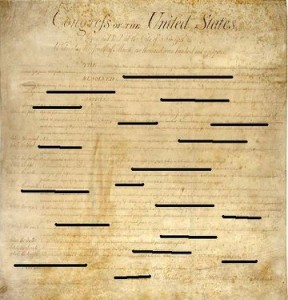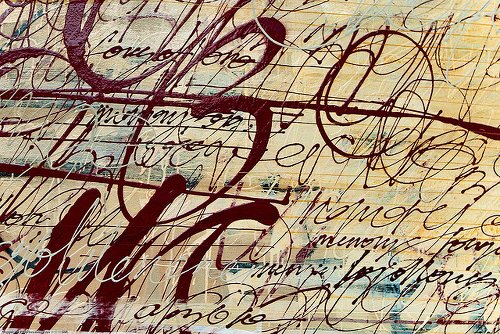In one of the region’s most surprising paradoxes, nearly every Arab country guarantees the right to free expression and a free press in their constitution.
Egypt’s 2014 constitution, for example, states succinctly in Article 65 that “Freedom of thought and opinion is guaranteed. Every person shall have the right to express his/her opinion verbally, in writing, through imagery, or by any other means of expression and publication.” Similarly, Article 70 guarantees “freedom of the press, printing and paper, visual, audio and electronic publication.”
In Morocco, the 2011 constitution that meant to usher in an era of reform similarly protects “The freedoms of thought, of opinion and of expression under all their forms” in Article 25 and guarantee freedom of the press without prior censorship in Article 28. Tunisia’s 2014 constitution echoes these points in Article 31: “Freedom of opinion, though, expression, media and publication shall be guaranteed. These freedoms shall not be subject to prior censorship.”
Freedom of thought and opinion is guaranteed. Every person shall have the right to express his/her opinion verbally, in writing, through imagery, or by any other means of expression and publication. —Article 65 of the Egyptian Constitution
Lebanon, Jordan, Sudan, and all the GCC countries except for Saudi Arabia also guarantee free speech but add a version of the caveat “within the limits of the law.” For example, Article 13 of Lebanon’s 1926 constitution (amended in the 1990s) states “The freedom to express one’s opinion orally or in writing, the freedom of the press, the freedom of assembly, and the freedom of association shall be guaranteed within the limits of the law.” Jordan asserts in Article 15 of its constitution that “Every Jordanian shall be free to express his opinion by speech, in writing, or by means of photographic representation and other forms of expression, provided that such does not violate the law.”
At first glance, this short phrase “within the limits of the law” may seem innocuous, as it also appears in international laws and the laws of established democracies, where there is an expectation that such limits will be narrowly defined. In practice, under Arab regimes, however, it is often used to provide cover for broadly repressive actions that directly contradict the supreme texts with which they should align “to water down constitutional rights under the pretext of providing more detailed arrangements. . . and render available constitutional protection irrelevant.”[ref]Mallat,Chibli. Introduction to Middle Eastern Law. New York: Oxford University Press, 2007. p. 229.[/ref] In fact, for every constitutional article that guarantees the right to free expression there may be several others in penal codes, press laws, and antiterror and anticybercrime legislation that restrict these rights.
For instance, Morocco continues to apply laws that circumscribe free speech, such as the 2002 Press Code and the 2003 Anti-Terrorism Law, and introduce new laws such as last year’s Code Numérique, that threaten free expression even after the adoption of the 2011 constitution. At one count in Egypt, more than 70 articles in 8 laws restricted freedom of expression. One Egyptian journalist said navigating so many restrictions is “like walking through a minefield.”
With the main exception of Saudi Arabia,[ref]Saudi Arabia makes no such promise in Article 39 of its Basic Law of Governance.[/ref] the contradictions between constitutions and the laws they are in theory supposed to govern, undermine not only the national legal frameworks themselves but also any expectation a citizen may have that his or her constitutional rights will be protected. To have any chance at changing this reality, advocates and policymakers must understand what allows it to persist.
The Failure of Constitutional Frameworks
As we wrote last week, the acceleration of the influence of Western law throughout the 19th and 20th centuries resulted in a “radical transformation of Middle Eastern law.” This transformation comprised new laws and institutions inspired by elements of Western legal frameworks, including constitutions and legislatures, but that didn’t fully adopt their intended spirit. In practice this meant that while democratic-looking constitutions have in most cases been drafted, they were promulgated without the mechanisms to uphold them. Specifically lacking were credible constitutional and judicial review processes and the independent judiciaries who could lead them.[ref]Mallat, p. 4–11.[/ref]
The Lack of Constitutional Review
Constitutional review is the process by which a law is evaluated for its constitutionality, or agreement with the principles set forth in a constitution. In the U.S. system, for example, constitution review is triggered as a case makes its way through the appeals system ultimately reaching the Supreme Court. In the French system, which predominates in Middle Eastern law, “a Conseil Constitutionnel reviews legislation immediately after it is passed by Parliament”[ref]Ibid, p. 185[/ref] and not in association with any specific case.
Constitutional review first appeared in the region in the 1980s. The exercise of constitutional review, where it exists, varies widely across the region, depending in part on the source law. Kuwait, Yemen, the UAE, and Egypt have experimented with the U.S. system, while former French colonies and protectorates like Lebanon, Morocco, and Algeria use the French system. Yet even in countries where provisions and/or institutions necessary for constitutional review are in place, “there is not one clearly decisive successful story of the rule of constitutional law in any one country,”[ref]Ibid, p. 207[/ref] writes Mallat. This is attributable to many factors.
there is not one clearly decisive successful story of the rule of constitutional law in any one country. —Chibli Mallat
First, the legacy of both the colonialists and early experiments of the Ottomans precipitated the development of “a judiciary which was not entitled to measure a statute against the supreme law of the land.”[ref]Ibid, p. 181.[/ref] So while a constitution may exist, “the courts have no constitutional jurisdiction.”[ref]Ibid, 143.[/ref] The result is that “When [judges] examine a case which involves a ‘human right’, judges cannot turn to the constitution which usually enunciates it.”[ref]Ibid.[/ref]
In addition, judges are far from empowered. They are often poorly paid[ref]Ibid, 214.[/ref] and serve at the pleasure of the ruler (sometimes even as foreign nationals, a common practice in Gulf countries[ref]Duffy, Matt J. “Arab Media Regulations: Identifying Restraints on Freedom of the Press in the Laws of Six Arabian Peninsula Countries,” 6 Berkeley J. of Middle E. & Islamic L. (2014), p. 3[/ref]. Further weakening their position, they are often the object of suspicion, if they are too public or independent, and political patronage.[ref]Mallat, p. 214.[/ref]
Equally problematic, in the French model, only certain people—such as deputies and ministers—can challenges laws in constitutional councils. “Constitutional action is thus withheld from the citizen.”[ref]Mallat, p. 209.[/ref] Inexplicably, this restriction is being replicated in the recently approved Arab Court of Human Rights, despite the fact that even France has eliminated this practice and numerous civil society organizations have spoken out against it.![[Egypt_CC]](http://www.smex.org/wp-content/uploads/2014/10/Egypt_CC.jpg)
Finally, other challenges related specifically to judicial review (or lower courts) include “the lack of systematic and reliable reporting” across the region and the lack of legal justification given with most court decisions. Without such documentation, “there is no public yardstick by which one can assess the consistency of courts.” [ref]Mallat, p. 213.[/ref]
Protecting the Government from the People
Mohammed Qutaishat, a media lawyer in Jordan who defends free expression cases and has written on defamation laws, sums up the situation: “Arab legislative policies for the media sector are [designed] to protect the government from the media.”[ref]Conversation with Mohammed Qutaishat, Doha, Qatar, January 27, 2014.[/ref] With the advent of social media, one could just as easily replace the “media” with the “people.” The outcome is troubling to say the least: Without constitutional review and independent judiciaries, there are no constitutional protections. And without constitutional protections, rights become all but meaningless.


